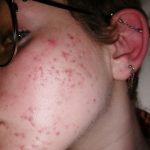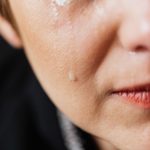How Doxycycline Ruined My Life Part 1

Doxycycline is in a class of medications called tetracycline antibiotics. It works to treat infections by preventing the growth and spread of bacteria. It works to treat acne by killing the bacteria that infects pores and decreasing a certain natural oily substance that causes acne. It works to treat rosacea by decreasing the inflammation that causes this condition. Doxycycline is indicated for the treatment of the following infections and diseases:
• Rocky Mountain spotted fever,
• typhus fever and the typhus group,
• Q fever,
• rickettsialpox,
• tick fevers,
• respiratory tract infections,
• urinary tract infections.
• lymphogranuloma venereum,
• psittacosis (ornithosis),
• trachoma,
• inclusion conjunctivitis,
• uncomplicated urethral/endocervical/rectal infections in adults,
• nongonococcal urethritis,
• relapsing fever,
• chancroid, plague,
• tularemia,
• cholera,
• campylobacter fetus,
• brucellosis,
• bartonellosis,
• granuloma inguinale,
• Escherichia coli,
• enterobacter aerogenes,
• Shigella species,
• Acinetobacter species,
• anthrax,
• Uncomplicated gonorrhea,
• Syphilis,
• Yaws,
• Listeriosis,
• Vincent’s infection,
• Actinomycosis, and
• infections caused by Clostridium species.
Doxycycline was patented in 1957 and came into commercial use in 1967. It is on the World Health Organization’s List of Essential Medicines. Doxycycline is available as a generic medicine. In 2019, it was the 90th most commonly prescribed medication in the United States, with more than 8 million prescriptions.
However, while it provides relief for many, its use has come at a huge cost to individuals whose lives have been ruined or turned upside down by the use of the medication. In this article, we bring you the story of a young girl whose life was ruined by doxycycline.
The Sylvia’s story
I am 33 years old and have had mild acne for 19 years. I have tried topical solutions, which tend to calm things down during treatment. Once stopped, the acne always returns. Feeling quite sensitive about my skin, I went back to see my GP.
She suggested doxycycline tablets. I had heard that particular tablets for skin problems could make you feel depressed and suicidal. I mentioned this to my doctor in the hope that she would tell me that the drug she was prescribing would not cause this. She did. I happily took the prescription to the chemist. The pharmacist then dispensed a loading dose of 200mg and a three-month supply of 100mg tablets, one to be taken daily.
I began the course feeling hopeful. The tablets did seem to be an effective treatment for the acne, although I noticed a change in how I was feeling. Initially this was not a problem, I felt good. Apart from a nagging headache and some nausea, I felt subtly disinhibited; freer in general. I actually found this quite liberating. This lasted for 3 days, at which point I started to notice that my mood was fluctuating quite quickly. I felt great one minute and extremely irritable the next. My tolerance for stress was decreasing rapidly. It would take one comment to switch my mood and I would become withdrawn and feel like screaming to be left alone. I would visit family feeling bright and upbeat but very shortly end up sitting in a completely separate room trying to calm down before making an excuse to leave. It’s only in retrospect that I can see that this was odd behaviour. Outwardly, I think I must have just appeared quieter, duller. Inwardly, I felt frustrated and angry. Although I can be quite sensitive under usual circumstances, this was heightened way beyond this. I did feel that it could have escalated further, had I continued with the medication.
Struggling to make the connection
Family members felt the need to speak to me, specifically to ask how I was feeling. Apparently I had been acting ‘oddly’, they used the words ‘withdrawn’ and ‘down’. These descriptions puzzled me as I had felt that I had swung to and fro from happy to angry, but did not have the insight to see that I was feeling low in mood, as they were describing it. Although under normal circumstances I would connect the two things together, under the influence of doxycycline, it seems that I could not make those connections. Looking back, I felt somewhat disconnected from external events and overly concerned, even locked into internal thoughts. These thoughts turned in to viciously negative ruminations, which made me feel anxious and unhappy.
It was after 3 days of the treatment that I began to notice that I was feeling anxious, escalating as the days and treatment went on. I was worrying about things that I would not usually worry about. I felt an increased heart rate; I could feel my heart thumping in my chest when I lay in bed, silly thoughts whirling through my head most of the night. Unsurprisingly, I found it difficult to sleep. Whilst I was searching for a solution to all my perceived problems, an idea literally popped into my head. I felt relief for the moment that I thought I would carry out this idea; to commit suicide, to kill myself. I brushed this aside as a non-solution and carried on being unable to sleep; obsessing over minor issues that just a second ago I had thought were worthy of ending my life over. At this point I could not see that this was absurd.
I continued taking the doxycycline, feeling quite pleased with its effect on my skin. Over the next few days I continued to feel anxious almost constantly, the feel good moments had gone. I was thinking more and more of that absurd solution to all of my problems that seemed to just get worse and worse. I would be driving in my car, at any time of day and suddenly think…I could just crash my car. The words repeated themselves in my mind for the remainder of the journey. I was struggling to not give in. By this time I had found some stories about others taking doxycycline, with disastrous results that ended in suicide.
Selfish and ‘disconnected’
Even then, I felt like there needed to be some deliberation about stopping the drug; it was working as a treatment for the acne. I felt like I couldn’t quite grasp the reality of the situation, I was somewhat removed. I would like to think that if I was to choose to end my life that I would not try to take other lives with me. Crashing my car would likely cause other injury or fatalities. Looking back, this seems like a very selfish and ‘disconnected’ thought to have.
In the end, I bargained with myself. I would stop taking the tablets to see if I ‘felt’ better. I could always re-start to cure the acne. Even though acne makes me feel sensitive about the way I look, I can’t ever imagine wanting to take the risk of death in the hope that it could be cured. I think this is another example of how I experienced feeling disconnected.
I gradually started to feel more like me as the days without Doxycycline went by. After 2 weeks I felt much better. After the first few days the impulsive suicidal thoughts had stopped, although I continued to feel anxious and ruminate about things. This reduced in intensity over the 2 weeks until I just felt my kind of normal again.
One of the lucky ones?
I did get the sense that the tablets had affected my hormones in some way. I can compare how I felt then to symptoms of PMT and my cycle had been set off course by 11 days. This may sound circumstantial but this is less than rare in my case; it has never happened to me before. These 11 days were days that came after I had stopped the tablets, so at first I did not think it was related. I searched the internet for things that could be the cause; I found quite a few cases implicating doxycycline in women with the same problem. This strengthened my suspicion that the effect may have been, at least in part, hormonal. The whole experience has deterred me from taking medications in the future. It’s frightening to think that a tablet I take for acne can make me want to take my own life. It’s even more frightening that I nearly didn’t make the connection.
The experience wasn’t fatal in my case, but others haven’t been so lucky.
This article first appeared in RxISK
Editorial note: In 1962, Sylvia Plath committed suicide a week after going on phenelzine, an antidepressant. She had two young children, making her death close to inexplicable – unless the medication she was put on disturbed the balance of her mind. But what does ‘disturb the balance of your mind’ mean?
In this account, another Sylvia put on doxycycline gives one of the best accounts there is of how easy it can be to slip away. Several weeks ago a RxISK story outlined the data linking doxycycline to suicide. This account is certain to make that data seem much more terrifying.





